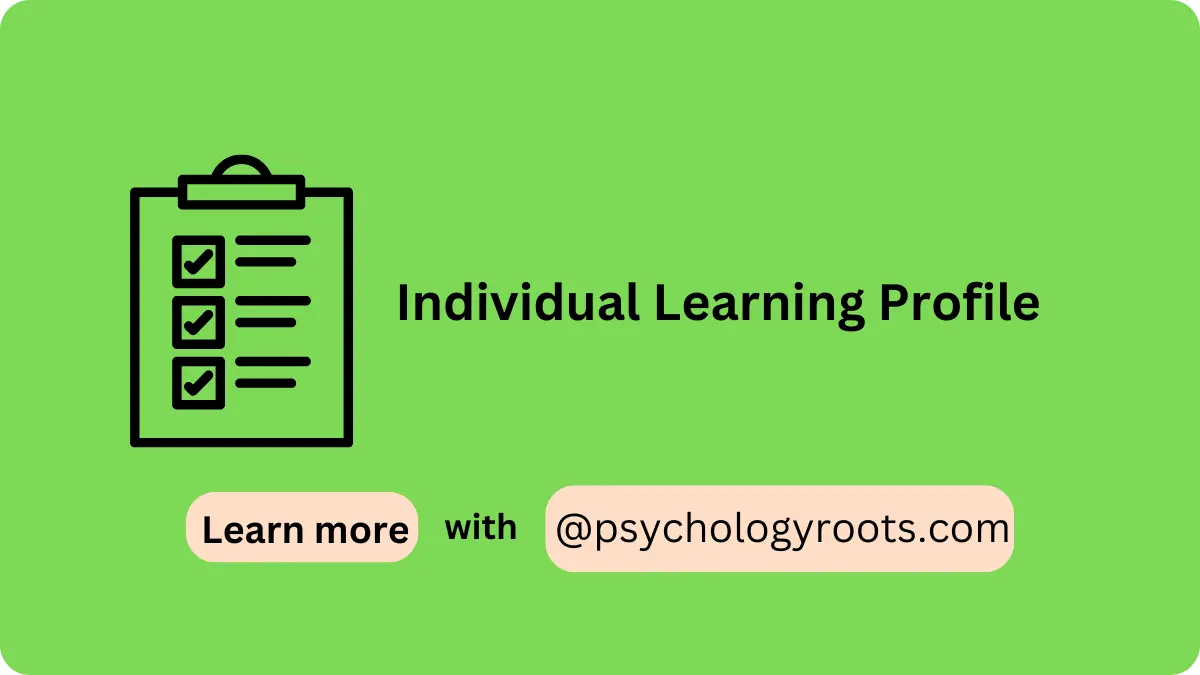Table of Contents
Individual Learning Profile
Here in this post, we are sharing the “Individual Learning Profile”. You can read psychometric and Author information. We have thousands of Scales and questionnaires in our collection (See Scales and Questionnaires). You can demand us any scale and questionnaires related to psychology through our community, and we will provide you with a short time. Keep visiting Psychology Roots.
About Individual Learning Profile
Scale Name
Individual Learning Profile
Author Details
Briony D. Pulford and Ria Sohal (2006)
Translation Availability
English

Background/Description
The Individual Learning Profile (ILP), developed by Briony D. Pulford and Ria Sohal in 2006, is a self-report questionnaire designed to assess college students’ confidence in their academic abilities across specific domains. Rooted in educational and social psychology, the ILP focuses on academic self-confidence as a predictor of academic success, aligning with theories of self-efficacy and personality influences on achievement (Bandura, 1997). Cited in Pulford and Sohal (2006), the ILP was developed to investigate how personality traits influence academic confidence, distinct from the Academic Behavioral Confidence (ABC) Scale, which focuses on anticipated study behaviors (Sander & Sanders, 2006).
The ILP comprises 24 items across six subscales: Reading, Writing, Numeracy, Hard IT (e.g., programming), Speaking, and Time Management. Respondents rate their confidence in each domain on a Likert scale (typically 1 = “Not at all confident” to 5 = “Very confident”), though the exact scale range may vary by study. Scores are calculated as means for each subscale, with higher scores indicating greater confidence. Validated in university student samples, the ILP is used to assess academic self-confidence, predict academic performance, and inform interventions for student support. It has been paired with tools like the Academic Social Comparison Scale (ASCS) to explore how social comparisons affect confidence (Pulford et al., 2018).
Psychologists, educators, and higher education researchers use the ILP to evaluate students’ academic self-confidence, identify areas for skill development, and design targeted interventions. Its domain-specific approach and link to personality traits are strengths, though English-only availability and limited cross-cultural validation may constrain its use.
Administration, Scoring and Interpretation
- Obtain a copy of the scale from authorized sources, such as Pulford and Sohal (2006) in Personality and Individual Differences (Vol. 41, pp. 1409-1419), ensuring ethical use permissions.
- Explain the purpose to respondents, noting that it assesses confidence in academic skills to support educational success, emphasizing anonymity and using clear, non-judgmental language.
- Provide instructions, asking respondents to rate their confidence in each academic domain (e.g., Reading, Numeracy) based on their current abilities, using the Likert scale.
- Approximate time for completion is 5-7 minutes, given the 24-item format.
- Administer in educational, clinical, or research settings, using paper or digital formats, ensuring a private environment. Oral administration may be used for accessibility.
Reliability and Validity
The ILP has robust psychometric properties, as reported in Pulford and Sohal (2006). Internal consistency for subscales is good (Cronbach’s α ≈ 0.70-0.85 across domains), though specific values vary by study. Test-retest reliability is moderate to high (r ≈ 0.65-0.80 over 6-9 weeks), indicating stability.
Convergent validity is supported by correlations with academic performance (r ≈ 0.30-0.50 for subscales like Reading and Numeracy) and self-efficacy measures (r ≈ 0.40-0.60). Discriminant validity is evidenced by weaker correlations with unrelated constructs, like general intelligence (r < 0.20). Criterion validity is demonstrated by predicting academic outcomes, such as GPA and course persistence. The ILP’s domain-specific structure is supported by factor analyses, confirming six distinct subscales. When used with the ASCS, it shows that upward social comparisons lower confidence in Numeracy, Speaking, and Hard IT, while less general social comparison correlates with higher confidence in Reading, Writing, and Time Management (Pulford et al., 2018). Pairing with measures like the Self-Efficacy Scale (Scherer et al., 1982) can enhance assessment.
Available Versions
Multiple-Items
Reference
Pulford, B. D., & Sohal, H. (2006). The influence of personality on HE students’ confidence in their academic abilities. Personality and Individual Differences, 41(8), 1409-1419.
Important Link
Scale File:
Frequently Asked Questions
What does the Individual Learning Profile measure?
It measures college students’ confidence in six academic domains: Reading, Writing, Numeracy, Hard IT, Speaking, and Time Management.
Who can use the scale?
Psychologists, educators, and higher education researchers studying college students.
How long does the scale take to complete?
It takes about 5-7 minutes.
Is the scale specific to certain groups?
It targets college students, with limited cross-cultural validation.
Can the scale inform interventions?
Yes, its domain-specific design supports targeted academic skill interventions.
Disclaimer
Please note that Psychology Roots does not have the right to grant permission for the use of any psychological scales or assessments listed on its website. To use any scale or assessment, you must obtain permission directly from the author or translator of the tool. Psychology Roots provides information about various tools and their administration procedures, but it is your responsibility to obtain proper permissions before using any scale or assessment. If you need further information about an author’s contact details, please submit a query to the Psychology Roots team.
Help Us Improve This Article
Have you discovered an inaccuracy? We put out great effort to give accurate and scientifically trustworthy information to our readers. Please notify us if you discover any typographical or grammatical errors.
Make a comment. We acknowledge and appreciate your efforts.
Share With Us
If you have any scale or any material related to psychology kindly share it with us at psychologyroots@gmail.com. We help others on behalf of you.